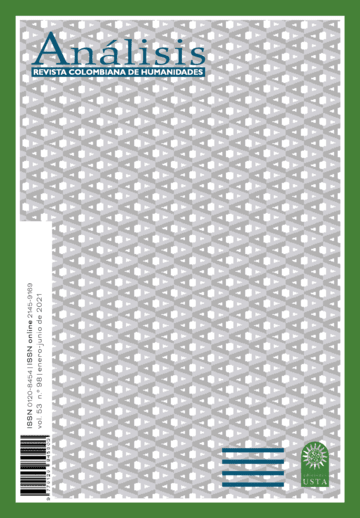Intelectualismo ético de Platón: relación de gnoseología y ética a partir del libro VII de la República
Plato’s ethical intellectualism: relation of gnoseology and ethics from book VII of The Republic
Intelectualismo ético de Platão: relação da gnoseologia e ética do livro VII da República
Abstract (en)
Knowledge has become a subject of great scope given the multiple disciplines that evoke it and whose research interests incur in a definition for it. The first disquisitions on knowledge were made under the dualistic view of materialism and idealism, both philosophical positions that determined the thinking of the West. Thus, since Classical Greece, thinkers such as Plato, among other classics, exalted this issue, but such dualistic treatment in the field of knowledge was strongly related to an ethical nature from which Plato himself was not released. This said, this article seeks to describe the gnoseological and ethical postulates in Plato in order to clarify the nexus between knowledge and human practice.
Abstract (es)
El conocimiento ha incursionado como tema de gran alcance dadas las múltiples disciplinas que lo evocan y cuyos intereses investigativos incurren en una definición para este. Primeras cavilaciones acerca del conocimiento se adelantaron bajo una óptica dualista de materialismo e idealismo, ambas posturas de carácter filosófico que determinaron el pensar de Occidente. Dicho así, desde la Grecia clásica pensadores como Platón, entre otros clásicos, entronizaron esta cuestión, pero dicho trato dualista en el ámbito del saber estuvo fuertemente vinculado con una reflexión de talante ético del que Platón no se eximió. Con lo dicho, el presente artículo busca describir los postulados gnoseológicos y éticos en Platón con el fin de esclarecer el nexo entre conocimiento y práctica humana.
Abstract (pt)
O conhecimento entrou como um assunto de grande alcance dadas as múltiplas disciplinas que o evocam e cujos interesses investigativos incorrem numa definição para ele. As primeiras reflexões sobre o conhecimento foram avançadas sob uma perspectiva dualista de materialismo e idealismo, ambas posições de natureza filosófica que determinaram o pensamento do Ocidente. Dito isso, desde a Grécia clássica, pensadores como Platão, entre outros clássicos, entronizaram essa questão, mas esse tratamento dualista no campo do saber estava fortemente ligado a uma reflexão da disposição ética da qual Platão não se isentava. Com isso, este artigo busca descrever os postulados gnoseológicos e éticos em Platão, a fim de esclarecer a ligação entre conhecimento e prática humana.
References
Annas, J. (1981). An introduction to Plato’s Republic. Belief, knowledge and
understanding. Oxford University Press.
Benson, H. H. (2006). A Companion to Plato. Platonic Epistemology, Ethics and
Metaphysic. First Published. Blackwell Publishing.
Boeri, M. (2007). La apariencia y realidad en el pensamiento griego. Ediciones Colihue.
Cornford, F. M. (2007). Teoría platónica del conocimiento. Paidós Ibérica.
Conford, F. M. (1989). Platón y Parménides. Editorial Visor.
Châtelet, F. (1995). El pensamiento de Platón. Editorial Colección Labor.
Guthrie, W. (1990). Historia de la filosofía griega IV. Platón. El hombre y sus diálogos.
Editorial Gredos.
Herrmann, F-G., Penner, T. y Cairns, D. (2007). Pursing the Good. Ethics and
Metaphysics in the Republic. Edinburgh University Press.
Nuño, J. (1988). El pensamiento de Platón. Teoría política y problemas éticos. Fondo de
Cultura Económica.
Platón. (1988). Diálogos IV. República (Eggers Lan C., trad.). Editorial Gredos.
Platón. (1988). Diálogos III. Fedón, Banquete y Fedro (García Gual, C., Martínez, M., y
Lledó Iñigo, E., trads.). Editorial Gredos.
Reale, G. (2001). Platón. Búsqueda de la Sabiduría Secreta (Heraldo Bernet R., ed.).
Editorial Herder.
Ross, D. (1993). Teoría de las ideas de Platón. Ediciones Cátedra
How to Cite
License
Authors who publish with this journal agree to the following terms:
Authors retain copyright and grant the journal right of first publication with the work simultaneously licensed under a Creative Commons Attribution License that allows others to share the work with an acknowledgement of the work's authorship and initial publication in this journal.
Authors are able to enter into separate, additional contractual arrangements for the non-exclusive distribution of the journal's published version of the work (e.g., post it to an institutional repository or publish it in a book), with an acknowledgement of its initial publication in this journal.
Authors are permitted and encouraged to post their work online (e.g., in institutional repositories or on their website) prior to and during the submission process, as it can lead to productive exchanges, as well as earlier and greater citation of published work (See The Effect of Open Access).






